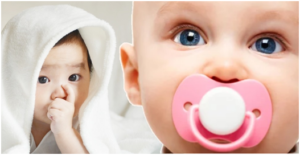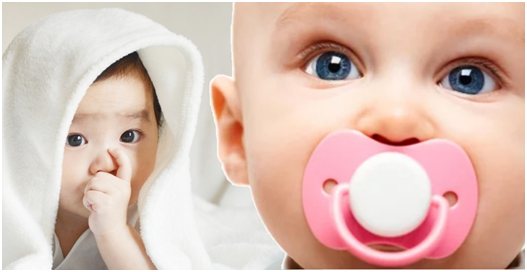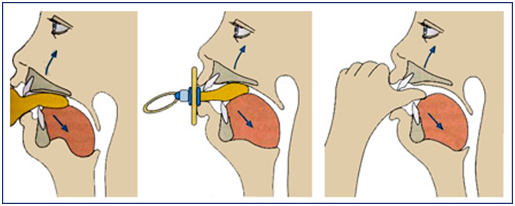
Thumb vs. Pacifier, Which is Worse?
Many parents are concerned about their child’s thumb sucking, finger sucking or pacifier use. You may be wondering at what age it should stop, or if it is harmful and what could happen if your child does not stop, and of the thumb and pacifier which is worse. Surprisingly, both the thumb and pacifier are about the same in how they move the teeth (see figure below).

However, the pacifier can be taken away whereas the thumb cannot! Therefore, a pacifier is preferred over thumb or finger sucking.
- For newborns and infants, a newborn thumb vs pacifier is preferred to limit the risk of SIDS.
- For babies and toddlers between about six months and up to age two, you should introduce a pacifier to replace the thumb during the day. Use the pacifier for a couple weeks then gradually take it away. If your child goes back to the sucking habit then continue with the pacifier for longer. During the nighttime, simply cover the hand(s) with a sock at night. For more instruction visit How To Stop.
- If the pacifier turns into a habit, ween your baby off of the pacifier with a teether.
- Pediatric dentists recommend eliminating the pacifier between by age two.
- Children two years old and up are too old to switch to a pacifier. They should skip the pacifier, and go directly to a breaking the thumb sucking habit using the recommended product.
Both the finger sucking and pacifier are a big source of comfort and security for your baby, and it is difficult for them to give it up. Thumb and finger sucking is natural and soothing, and about 20% of babies do it within their first year of life. You can rest assured that sucking is one of an infant’s natural reflexes. Infants and young children may suck on thumbs, other fingers, pacifiers or other objects. The thumb vs pacifier makes them feel secure and happy, and it helps them learn about their world. Placing a thumb or another finger in the mouth provides some children with a sense of security during difficult periods, such as when they are separated from their parents, surrounded by strangers or in an unfamiliar environment.
Since thumb sucking is relaxing, it also may help induce sleep. For this reason, young children may suck their thumbs in the evening or at other times when they are tired.
Prolonged thumbsucking may cause problems with the proper growth of the mouth and the alignment of teeth. It also can cause changes in the roof of the mouth. Children who rest their thumbs passively in their mouths are less likely to experience difficulty than those who vigorously suck their thumbs. When an active thumb sucker removes his or her thumb from the mouth, a popping sound often is heard. Some aggressive thumb suckers may cause problems with their primary (baby) teeth.

Although is never too early to break the habit, for babies it may be better to ween your baby off gradually. If your child at least two years old check then proceed to learn about how to stop thumb and finger sucking. Keep in mind, sucking thumb or fingers should never be reprimanded. It is better to praise success and motivate with positive feedback.
Related: Do pacifiers help prevent SIDS?
The American Academy of Pediatrics recommendations state that using a pacifier might be protective against Sudden Infant Death Syndrome (SIDS) for newborns and babies. Further, a study published in a 2005 issue of the British Medical Journal found that babies who used pacifiers while sleeping were significantly less likely to die of SIDS than those who did not use them, regardless of whether the infants slept on their backs or their stomachs. The researchers speculated that the pacifier may have kept the airways open and also that the handle of the pacifier may have prevented the baby from burying its head in the bedding.As a result, more parents are preferring the pacifier versus thumb until age two or so.